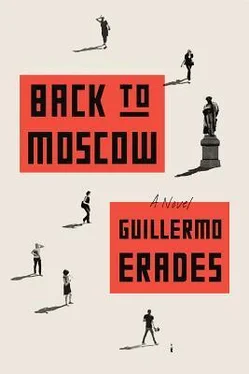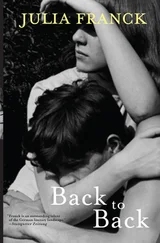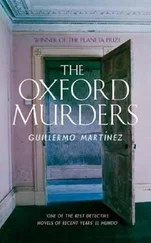MIND THE CLOSING DOORS. Next stop: Chistye Prudy.
I was heading north on the red line, rocked from side to side, observing the other passengers, not thinking of anything in particular.
As the metro clanked through endless tunnels, I began to reflect upon the sheer size of the city, how nobody could tell me how many people lived in it. More than in Paris or London or New York, I was often told.
Every day, millions of unsmiling Muscovites navigated their way through the underground arteries of the city. Silent strangers in dark clothes, crammed into wagons yet trying to avoid human contact, staring at their newspapers, at their books, into the air. Not a smile. Every passenger in Moscow’s metro seemed deeply unhappy.
Mind the closing doors. Next stop: Krasnye Vorota.
You could hop on any metro line and get off at a random station, and you would always resurface among wide streets and identical buildings. Each suburb had a different name, often related to communist lore, but they all looked pretty much the same. Stations had their own makeshift markets, which sold cheap clothes and newspapers and chocolates and flowers and gloves and hats and scarves and pirate CDs and, later on, mobile phones.
Mind the closing doors. Next stop: Komsomolskaya.
When we first met, some three weeks after my arrival, Ira was about to start working part-time as a secretary at an American firm. Wanting to improve her English but unable to afford language classes, she’d pinned a handwritten ad on the announcement board of my faculty. You want to practise Russian?
On Tuesdays we spoke in English and on Thursdays we spoke in Russian. That was our arrangement. We would meet in the first-floor cafeteria at MGU, where they only served a local variety of instant coffee and the price of a cup changed according to the amount of sugar you wanted in it.
Ira had a boyfriend, a piece of information she’d forced into the conversation while we were sipping our first cup of coffee, and this was good, I thought, as I could do with a real Russian friend. Besides, I wasn’t attracted to her. Ira was plumpish, and her eyes, an undefined watery colour, were always framed by dark circles. Her hair was thin, short and messy. By Moscow standards, Ira was what Colin referred to as below average.
Mind the closing doors. Next stop: Krasnoselskaya.
So we became friends, Ira and I, and she introduced me to another side of Moscow — not the clubbing scene or expat hang-outs, which she didn’t really know, but the cultural side of the city. She showed me the places where the young intelligentsia gathered, and she used those words, young intelligentsia, by which she meant, I realised, other cash-starved students. Ira introduced me to some of her girlfriends. They were very nice but, for some reason which defied the rules of probability, not one of them was above average.
Ira and her friends taught me modern slang and expressions I would not learn at language class with Nadezhda Nikolaevna, who was a hundred years old and probably didn’t know them. From Ira I also learned Russian swearwords, which proved useful with time, when I began to take on rude waitresses and shop assistants.
It was Ira who first showed me Café OGI, the underground establishment, famous in Moscow, that later sprouted two separate cafés with similar looks and names — all selling cheap books, cheap food and cheap drinks. But Ira took me to the original one, on Chistye Prudy, and it was dark and smoky, out of a Dostoyevsky novel, and, as I sipped on a warm beer, I glanced around at the colourful clientele, trying to identify the philosophers, the schemers and the impoverished students with murderous intentions.
Mind the closing doors. Next stop: Sokolniki.
I jumped off the metro, took the escalator up to the street. It was a cold December day. I wandered in the snow for ten minutes, holding a hand-drawn map in my gloved hands, trying to recognise, among the indistinguishable blocks and entrances, which one corresponded to the one where Ira had drawn a cross. It was dark and by the time I found the podyezd, as they called the entranceway, it was quarter past eight. I tapped in the entry code, as written on Ira’s instructions, and took the lift to the third floor.
‘Happy birthday,’ I said when Ira opened the door. ‘This is for you.’
I handed her a bottle of expensive French wine I’d bought in Eliseevsky.
‘What else?’ Ira asked.
‘Was I supposed to bring anything else?’
‘Of course not,’ she said, laughing. ‘This is great. What I mean is, what else are you going to tell me? Or is happy birthday all you wish me?’
I took my shoes off, placed them at the end of a line of shoes ranged neatly along the wall. ‘What’s wrong with happy birthday?’
‘Martin, in Russia you can’t only wish someone happy birthday.’
I handed my coat to Ira. ‘You can’t?’
‘Happy birthday is just a formula,’ Ira said, hanging my coat on a rack bulging with winter clothes. ‘You need to tell me what you wish for me in the next year, like happiness, love or success, you know.’
‘Sorry, I didn’t know. I do wish you all that as well.’
A pungent smell of cabbage wafted in from the kitchen.
‘This is Sergey’s mother,’ Ira said, pointing at the older lady who had just appeared. ‘Aleksandra Olegovna.’
Aleksandra Olegovna had clearly made an effort to look festive. Her hair was blown out, in the fashion of 1980s pop singers, and she was wearing a black dress and a thick necklace with pearly stones. She was in her late forties or fifties, I could never tell with older Russian women.
‘Come in, come in,’ Aleksandra Olegovna said. ‘Apologies for the small apartment.’
It was customary among Muscovites to apologise for the size of their apartments. Colin said it was yet another manifestation of their inferiority complex vis-à-vis foreigners that, in the minds of untravelled Russians, all Westerners live in big houses. The thought made me laugh as, in Amsterdam, I’d been living in the smallest of flats, with a cupboard shower at the back of the kitchen and a sink I used both for shaving and piling up dirty dishes.
I was led into the kitchen, where I was introduced to about a dozen people. Ira’s cousins, aunts, friends, a young couple I’d met before and Sergey. All Russians. All crammed around the table in silence, under a bright neon light. There was no music — you could hear the rattling of the old fridge. Realising that I was the last one to arrive, I wondered if the others had been asked to come earlier.
The table was covered with a flowery tablecloth and blanketed with food: mayonnaise-based salads, smoked salmon, beef-tongue jelly, pickled herring, salted cucumbers, mushrooms, boiled potatoes with butter and dill, smetana. Everything was untouched.
At the centre of the table stood three bottles of vodka.
Sergey’s mother offered me a chair at the head of the table, which, I guessed, she must have been using before my arrival. I refused, but she insisted and, to avoid further awkwardness, I accepted. She sat on a stool next to the fridge.
‘Dear comrades,’ Sergey said, ‘let the party begin.’
For some reason everybody laughed.
Sergey stood up, opened a bottle of vodka, filled all of our glasses. ‘I would like to dedicate this first toast to Ira,’ he said, ‘my beloved girlfriend, whose birthday we are celebrating today.’
He was talking in a rather formal tone — I wasn’t sure if it was for real or meant to be a joke.
He looked at Ira. ‘Irinochka, lyubimaya, I would like to wish you a long happy life full of love and friendship and success, professional, personal, spiritual. May all your wishes come true. To Ira!’
Читать дальше












